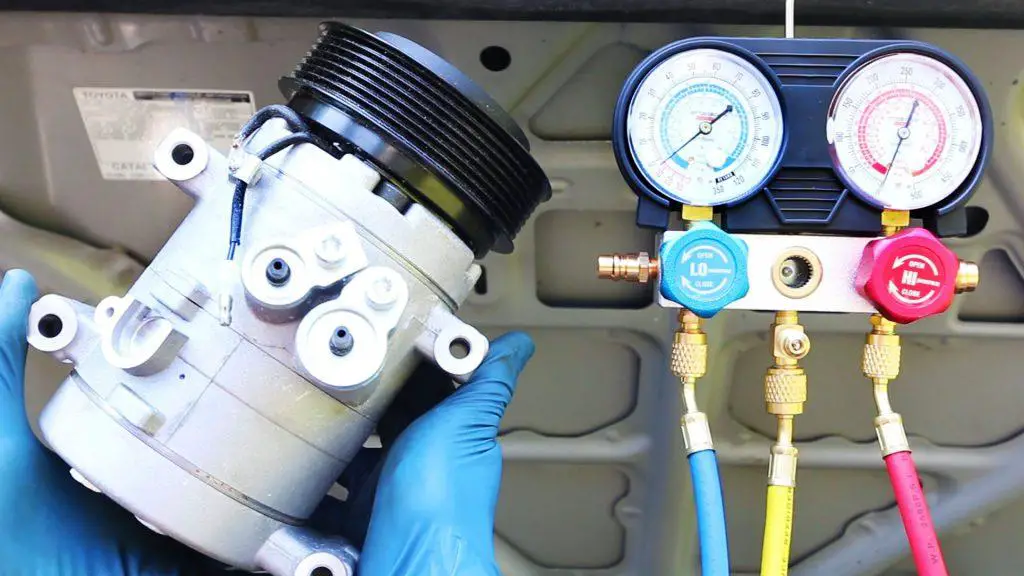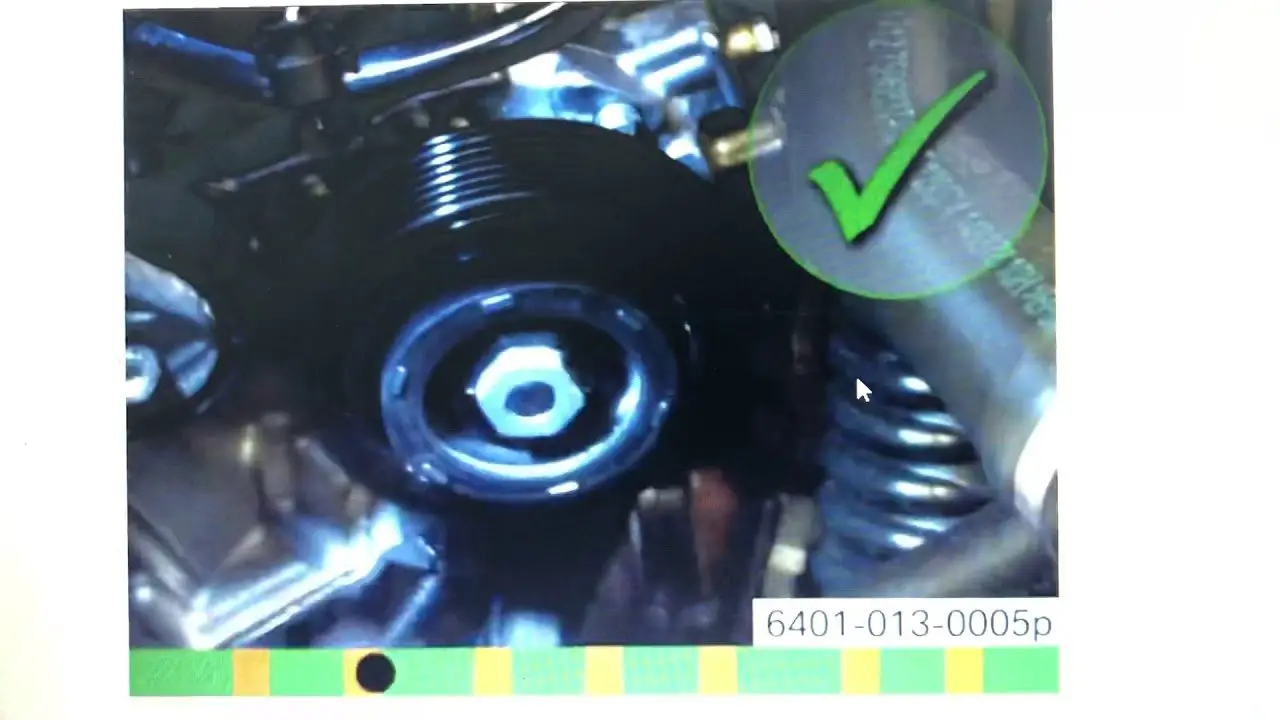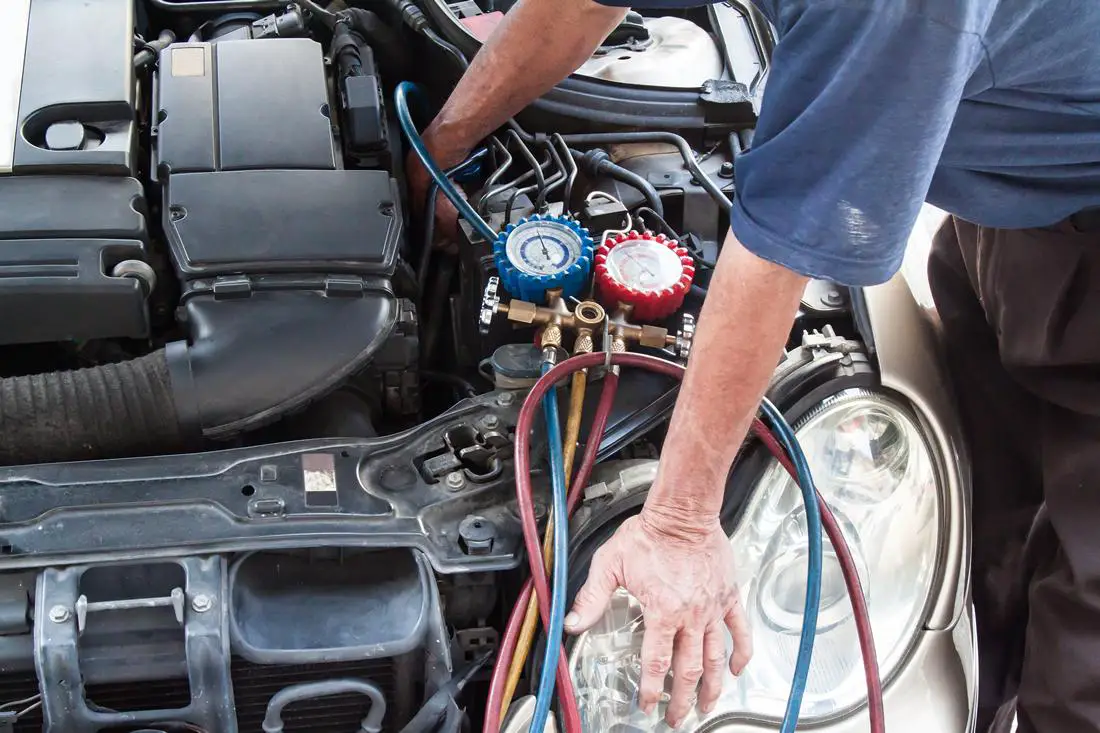What Is An Ac Compressor
AC compressor is an important part in the cars air conditioning system. In the words of many repairmen, an AC compressor is the heart of an AC system. In simple terms, an AC compressor is a pump which creates the heat by putting the air conditioning refrigerant under extremely high pressure. The AC compressor is called a pump because both increase the pressure on a fluid and both can transport the fluid through a pipe. As gases are compressible, the compressor also reduces the volume of a gas. Liquids are relatively incompressible while some can be compressed, the main action of a pump is to pressurize and transport liquids.
The AC compressor consists of 2 ports, an inlet and outlet, or suction and discharge respectively. The suction port is always the larger diameter hole. Refrigerant is sucked into the compressor, compressed, and discharged through the outlet, headed for the condenser. Inside the compressor is a complex series of passageways, valves, bearings, and other components.
Compressor Clutch Is Not Moving
Another sign of a problematic compressor is the clutch not moving. The clutch on the compressor is what allows the pulley to engage and disengage from engine power so that the compressor is only turning when it needs to be. The clutch can seize, which permanently keeps the compressor activated or it can break, which means the compressor will not be able to receive engine power. Sometimes the clutch itself can be replaced, but usually replacing the entire compressor turns out to be the most efficient repair.
The AC compressor is the heart of the AC system. If you suspect that your AC compressor or another component of your vehicles AC system is having issues, consider having the system diagnosed by a professional technician, such as one from YourMechanic. If necessary, they will also be able to replace the AC compressor for you.
What Is An Ac Compressor Clutch
A car AC compressor clutch is used to connect and disconnect drive power to the cars AC compressor shaft. Unlike a cars transmission clutch, an AC compressor clutch is either transmitting full drive power to the AC compressor or notits not supposed to provide partial power. A slipping AC compressor clutch is a sign of severe wear, shorted clutch coil or an incorrect air gap .
Some engines use a dedicated drive belt to drive the AC compressor, while others use a drive belt that drives multiple components. The AC compressor drive belt rotates the compressor pulley at all times when the engine is running. But the pulley will not rotate the AC compressor shaft unless the compressor clutch has engaged.
Read Also: What Do I Need To Register My Car In California
Symptoms Of Bad Ac Compressor
How to know if AC compressor is bad is actually not as difficult as you thought since the symptoms of bad AC compressor are clear to see. There are. bad ac compressor symptoms which you may see when your car has a bad AC compressor. Following these symptoms will give you a basic knowledge to diagnose your car.
Key Indicators Of Compressor Failure

We mentioned above some typical symptoms of compressor failure, but what do they mean and how do they happen?
Leaks often mean that refrigerant will be escaping the system somewhere along the line. Compressor leaks typically happen around the shaft seal, hoses, O-rings and gaskets. They can be hard to spot and might require the use of a special UV dye or electronic leak detector to locate. The refrigerant also carries an oil mist that circulates to keep everything lubricated. Without enough refrigerant, the aircon cycle will not happen and can result in damage to other parts, not just the compressor.
Odd noises there could be a few reasons for this one. Either internal parts of the compressor have failed which can result in some unpleasant sounds, or something has seized. The compressor clutch or belt pulley is likely here.
No cool air likely due to lack of refrigerant or a failing component, the compressor cant circulate enough refrigerant to keep the system running smoothly.
ECU error if you get a check engine light on your dash, this is a definite sign something more sinister is lurking. The ECU measures voltage signals to parts like the compressor, and can detect malfunctioning signals which might result in incorrect voltage delivery.
Some common causes of failure are:
- Corrosion
- Ageing or wear and tear
You May Like: Car Shakes When Idle And Accelerating
Ac Accumulator / Drier
The Accumulator/Drier collects and absorbs moisture. Moisture is like poison to the internal system components and can damage the AC Compressor as well. Depending on your vehicle, you may have an accumulator or a receiver/drier.
Common Problems: Internal failure allowing desiccant material to enter the AC system. Like sugar in the gas tank, this stuff in the wrong places can cause major problems. Leaks can result in over-saturation of the desiccant material that can lead to compressor damage.
It’s All About The Pressure
Air conditioning systems leverage high-and-low pressure. Before the Freon is converted into a liquid in the high side, it starts out as a gas in the low pressure side of the system. The vehicle is kept cool by the constant circulation of refrigerant through the high and low pressure sides of the system.
Vehicle Air Conditioning System
Vehicle Air Conditioning System
Don’t Miss: What Kind Of Oil Does My Car Use
Check For Unusual Noises
If your clutch is successfully engaging and disengaging periodically, then you dont have clutch-related issues. With the engine and AC running at max, open the hood and listen for any unusual sounds like clunking, grinding and squealing noises coming from the compressor and pulley assembly. A grinding noise could indicate the pulley or internal compressor bearing is faulty. A broken pulley bearing can be easily replaced but internal compressor bearings warrant a compressor replacement. A leaking bearing will also cause squealing noises to emanate from the compressor. A clunking noise indicates that the compressor has broken and the metallic debris in the compressor is slashing around causing an unsettling clunking noise. In this case, the only solution is to replace the compressor unit. The squealing noise can also be due to excessive belt tension. Try relieving the stress on the belt by loosening the tensioner assembly.
If you suspect that the pulley bearing is toast then you can verify that by checking for play in the pulley assembly. With the assembly attached to the compressor, try rocking the pulley back and forth and If it wobbles or rocks then the problem lies in the pulley bearing. Replacing the pulley assembly is doable since they are sold separately from the compressor unit. It is also a good idea to swap out the clutch plate while youre at it to futureproof the compressor.
How To Diagnose Car Ac Compressor Failure
- HowTo
- How to Diagnose Car AC Compressor Failure
Air conditioning is something many people take for granted until it stops working. It can be annoying if during a hot day, you reach down to crank up your AC and all that comes out is hot air. More importantly a bad compressor can be dangerous. If your compressors bearing goes bad, your engine can seize due to the stuck compressor. If you are traveling at speed and the car shuts off, you no longer have power steering nor is your brake booster functioning. There are a few reasons your AC system might stop working and the central part of it is the AC Compressor. Here are a few ways to diagnose a car AC compressor failure.
Step 1:
If the air temperature does not cool when the AC system has engaged there is a good chance that there was an AC compressor failure. If the AC still works, check to see if the temperature fluctuates while the AC system is running.
Step 2:
Find you AC compressor and visually inspect it for rust, physical damage, oil leaks or paint damage. All of these are signs of a car AC compressor failure. With a lack of oil, the compressor will not function efficiently and will cause premature wear. The increased friction will also lead to erratic temperatures when the AC system is engaged.
Step 3:
Check your belts to ensure there is proper tension and the belts are not damaged. Cracked or splitting belts can cause further damage to your AC compressor. If they are bad, they should be replaced with a new compressor.
You May Like: How To Negotiate A New Car
S On Testing The A/c Compressor Clutch Coil
You can quickly diagnose a defective clutch. But when running tests on your clutch, you should be very careful considering that the coils harness plug is small and is quite challenging to test. It will be helpful to take caution when you work around spinning and hot parts. Below are simple steps on how to do the tests:
How To Test Your Car’s Ac Compressor
If your car’s air conditioner stops blowing cold air and appears to only blow air, it may be low on Freon — or it may require a new AC compressor. Testing the AC compressor is a relatively simple task you must simply follow a few simple steps to determine whether the compressor requires repair or replacement.
Step 1
Turn the vehicle on, shift it into in park and engage the emergency brake. Turn on the AC. Connect a pressure gauge to the low side of the AC compressor, typically found on the firewall passenger side in the engine compartment. Add approximately 2 oz. of Freon to determine whether the compressor kicks on .
Step 2
Discontinue adding any more Freon at this point. On a 75-degree day, normal pressure should be approximately 38 lbs. per square inch — known as the “blue zone” on most gauges. If the compressor has not kicked on, check the fuses — usually located in the glove box. Iif you have trouble locating them, refer to your owner’s manual.
Check the leads to the compressor, the magnetic clutch and operation. To do so, grab a lead from the batter to determine whether the clutch engages. Check the high- and low-pressure switch. Check the AC control on the dash. If you cannot get the compressor to kick on and cannot find the problem with troubleshooting, you may need to replace the AC compressor.
Tips
Things You’ll Need
- Freon
Writer Bio
More Articles
You May Like: What Is The Best Car Wax
Reason #: Electrical Issues
Electrical issues are perhaps the most difficult problem to diagnose when it comes to an A/C unit that has stopped working. First, a visual inspection of all the wiring should be done to see if any wires are broken or frayed.
If any damaged wires are found, they should be mended with electrical tape or replaced altogether. If youre unable to visually locate any electrical issues, it may be time to take your vehicle to an experienced dealer for further diagnosis.
Understanding The Ac System And Components

Your car’s air conditioning system works just like a refrigerator or your home air conditioning. The purpose of the system is to remove hot air from the inside of your vehicle. It consists of the following components:
Component 1: Compressor. The purpose of the compressor is to pressurize the air conditioning system and circulate the refrigerant. It’s located at the front of the engine and is typically driven by the main drive belt.
Component 2: Condenser. The condenser is located in the front of the radiator and is used to remove heat from the refrigerant.
Component 3: Evaporator. The evaporator is located inside the dash of the vehicle and is used to absorb heat from the interior of the car.
Component 4: Metering device. This is known as a metering tube or an expansion valve and can be located either under the dash or under the hood near the fire wall. Its purpose is to change the pressure in the air conditioning system from high pressure to low pressure.
Component 5: Hoses or lines. These consist of metal and rubber lines to carry the refrigerant.
Component 6: Refrigerant. Typically, all systems today contain R-134A refrigerant. This can be purchased over the counter at most auto parts stores. Older vehicles were built with R-12, which is no longer used because it contained high amounts of ozone depleting compounds. If you have a license and certification you can still purchase this, though most people opt to retrofit this system to the newer R-134A refrigerant.
Don’t Miss: What Is A Title For A Car
How Cooli Air Passes Through The Vents To Passenger Compartment
The evaporator absorbs the heat of the air thats flowing over the evaporator. After that, it cools down the air, and the air travel through the dash and comes out from the vents.
After the refrigerant leaves the evaporator core, it returns to the ac compressor, and the whole thing is just going to keep repeating as long as you turned on your ac.
Bad Car Ac Compressor Symptoms
AC compressors endure a lot of stress. Car air conditioning systems get turned on and off constantly and this power fluctuation may put a lot of wear on the compressor.
Over a certain number of years, this stress could wear down the compressor and cause it to eventually malfunction. People who use their air conditioners on a regular basis will experience problems with them sooner than those who never run the AC.
There are some warning signs that will present themselves if your AC compressor is starting to go bad. Below are 4 common symptoms.
Also Check: How Much Air Pressure In Car Tires
How Can We Help
Just because your car air conditioner has stopped cooling doesnt mean that all is lost. In fact, the fix may be a relatively inexpensive repair that can be done in just a matter of minutes. We understand that this can be an extremely frustrating thing to happen to your vehicle, so we wanted to equip you with the necessary knowledge to troubleshoot these things on your own if possible.
If youre still having trouble trying to fix these issues yourself though, and youre in the Central Missouri area, then feel free to give us a call or stop by our repair shop. Wed be happy to have our experienced ASE-certified technicians take a look and get you back on the road in no time.
How Do I Know If My Car Needs Freon
Also Check: What Car Rental Companies Give Aarp Discounts
Is My Compressor Broken
There can be several reason your compressor may not work, but if you’ve checked the electrical system, for any leaks, and the clutch, then it may be that your compressor has an internal mechanical or electrical problem that needs to be fixed.
My recommendation is to replace the entire unit if the compressor is bad. The reason for this is you’ll likely save time and money by replacing the old one with a new one. Fairly frequently a rebuilt AC compressor will go bad again, sometimes not too much later after it is reconditioned.
The labor is intensive when taking one out and putting in a new one. If you have to do that twice you end up losing quite a bit of money. And a new compressor really doesn’t cost too much more money then getting an old one repaired.
So getting a new compressor will be your best bet in the long run and sometime short term as well. Watch this video if your interested in installing your own compressor. Here’s another video with more information to help you along the way.
Turn On The Engine Inspection
After your visual inspection turn on the engine:
1. With the engine on, turn the AC to high – You’ll be looking at the serpentine belt for any issues. Then look at the compressor clutch. The pulley should be be turning and then you’ll need to wait, maybe a minute or so, and the compressor clutch should engage and start spinning also.
2. If you’ve waited several minutes while the engine is on and the AC is turn to maximum, and the clutch still isn’t engaging there’s something not working correctly.
3. If the clutch is engaging, but the AC isn’t cold there could be a leak in the AC system. In that case you’ll need to find the possible leak. Here’s a video that explain how to find a leak using a florescent dye – How to Find AC Leak
4. You can also try a refrigerant leak detector and then get a can of stop leak. Make sure it is compatible with your refrigerant type.
You May Like: How To Make Car Seat More Comfortable
We All Know How Hot The Texan Heat Can Be
The Texan heat is tough on air conditioning systems, and during the summer months, the last thing you want is to head out for a long drive only to realize your vehicle’s air conditioning is not working. The chemical used to provide cool air is called Freon. Without it, there’s no way to circulate cold air throughout your vehicle cabin.
Fried Egg Cooked on Texas Car Hood
Reason #: The Condenser Is Broken

If there doesnt appear to be anything blocking the condenser, its possible that it may be broken altogether. A broken condenser can be caused by a puncture from road debris going through the grill of your car and damaging the part, or equipment failure.
If you notice any noticeable punctures in the condenser upon a visual inspection, typically the only way to fix the issue is through replacement.
Also Check: How To Fix Heat In Car
